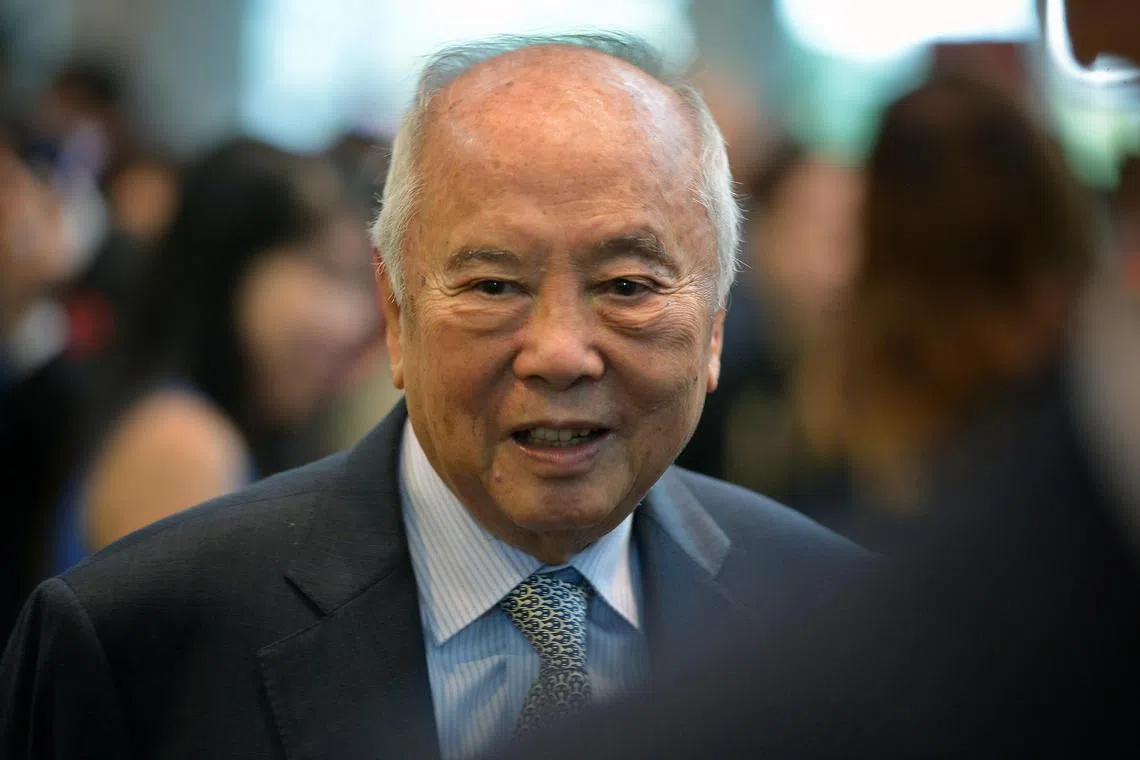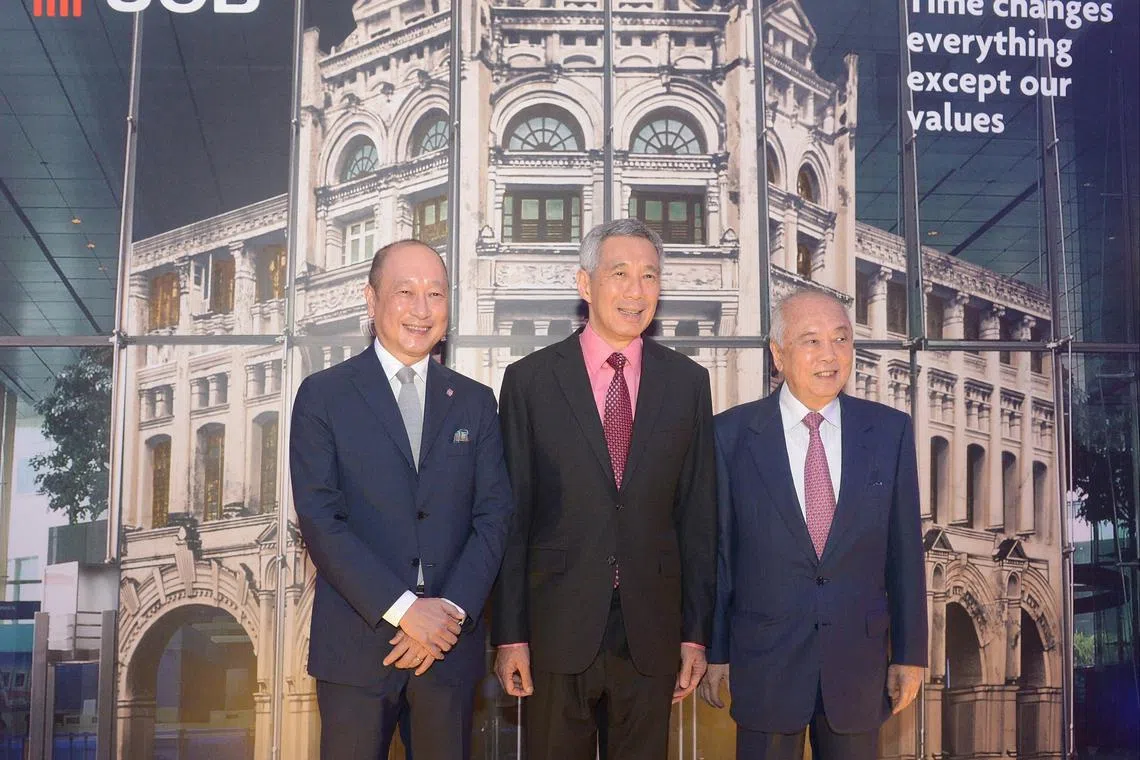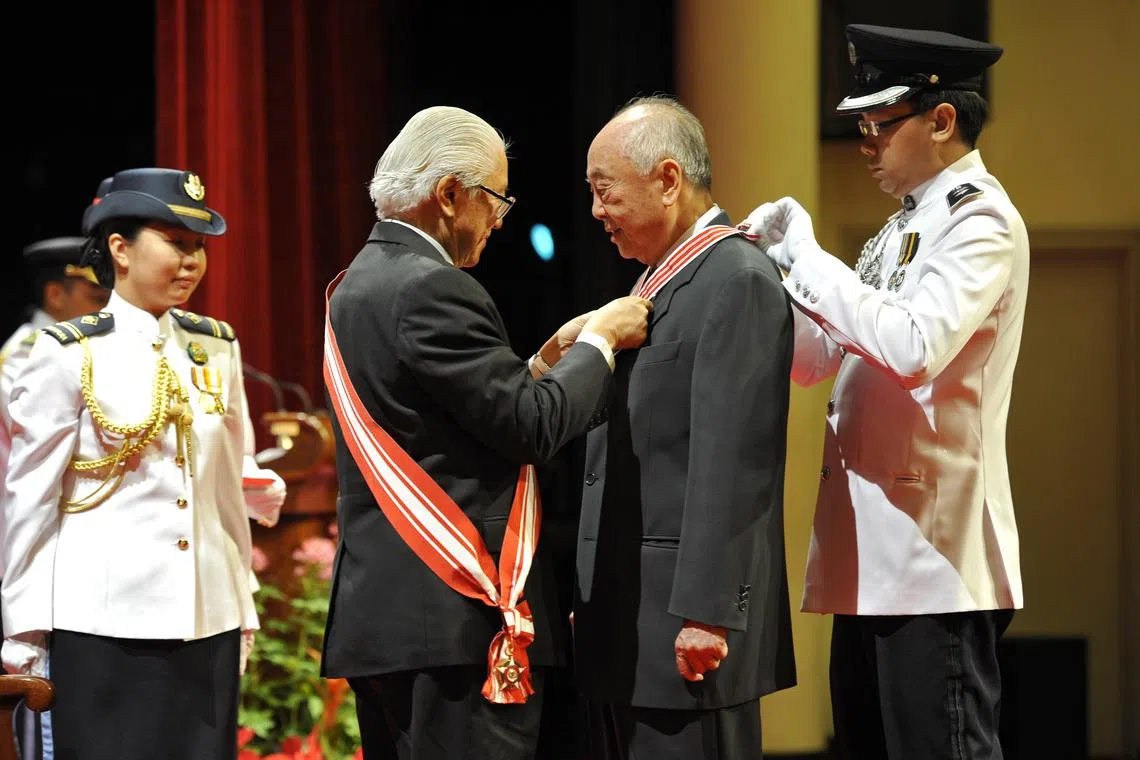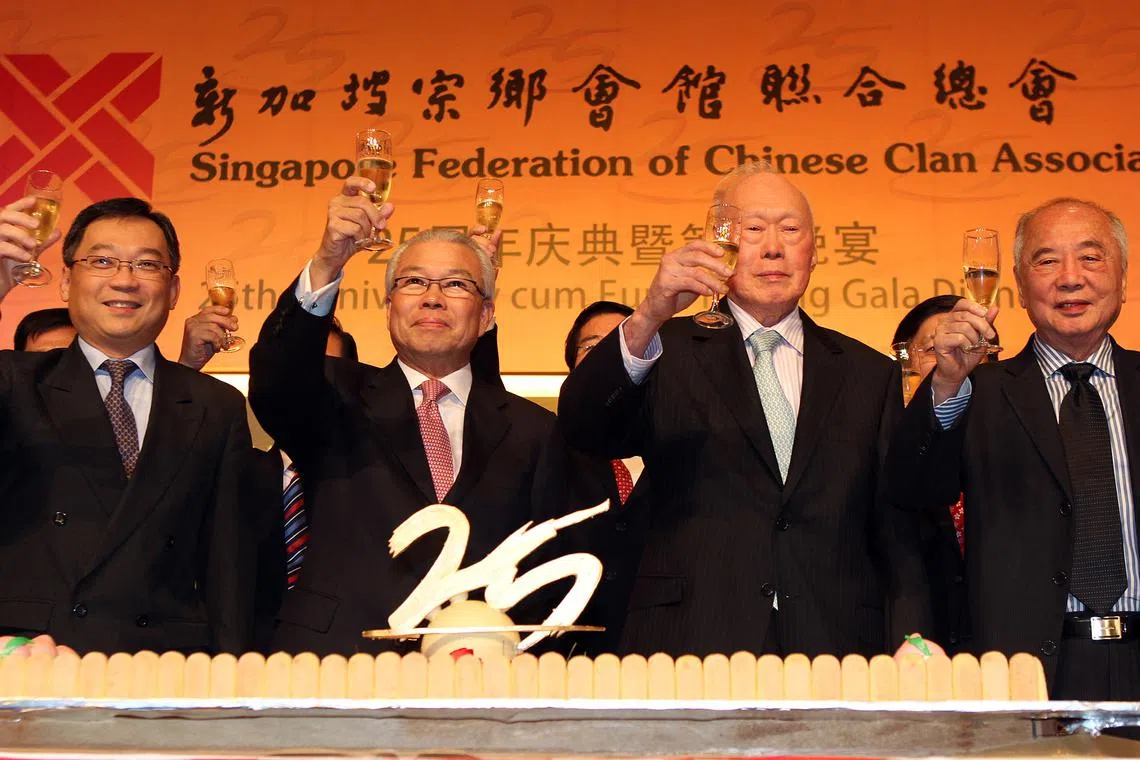S’pore tycoon and former UOB chairman Wee Cho Yaw dies at 95
Sign up now: Get ST's newsletters delivered to your inbox

Under Mr Wee Cho Yaw's leadership, UOB saw its assets increase from $2.8 billion to more than $253 billion, growing from 75 branches and offices to more than 500 globally.
ST PHOTO: KUA CHEE SIONG
SINGAPORE – Billionaire Wee Cho Yaw, chairman emeritus and honorary adviser of UOB, has died at the age of 95. The bank announced Mr Wee’s death in a Feb 3 statement on Facebook.
Described by UOB as a “visionary, banker extraordinaire, community pillar and celebrated pioneer”, Mr Wee – whose net worth was estimated by Forbes to stand at $7.2 billion as at Feb 2 – helmed the UOB Group for more than 60 years, retiring in April 2018.
Under his leadership, the bank saw its assets increase from $2.8 billion to more than $253 billion, growing from 75 branches and offices to more than 500 globally.
‘His values will endure at UOB’
After news of Mr Wee’s death broke, tributes poured in from political leaders, as well as organisations that were closely associated with him.
President Tharman Shanmugaratnam called the late banker “a tenacious, but very warm personality”.
Mr Tharman said: “He had an insatiable appetite for work and a shrewd eye for opportunities – unmatched in local banking. He was also committed to his staff. It made UOB a leading bank in the region, and helped build up our financial centre.”
He added that Mr Wee’s community leadership – at the Singapore Hokkien Huay Kuan and Singapore Federation of Chinese Clan Associations (SFCCA) – had left a permanent legacy.
“Wee Cho Yaw was simply unique. He left us today at age 95, but will never be forgotten,” Mr Tharman said.
Deputy Prime Minister and Finance Minister Lawrence Wong praised Mr Wee’s “transformative leadership”, which turned UOB into a regional banking powerhouse.
“His vision and ethical standards set a lasting industry benchmark, and his contributions to our financial centre and much more will be remembered,” said DPM Wong.
Deputy Prime Minister Heng Swee Keat said Mr Wee was passionate about uplifting other businesses, particularly small and medium-sized enterprises in Singapore.
“In my interactions with Mr Wee over the years, I have always admired and learnt from his drive and business acumen, as well as his commitment to serving the community,” said DPM Heng.
UOB chairman Wong Kan Seng lauded Mr Wee as one of Singapore’s “most successful entrepreneurs”.
“Through hard work, determination, decisiveness and strong Asian values, he built UOB into one of the world’s most admired banks,” said the former deputy prime minister. “His towering presence can be seen across Singapore through the many industries, businesses, individuals and communities that UOB has supported over the years. He has also made many important contributions to the development of Singapore as a global financial centre.”
Deputy chairman and chief executive of UOB Wee Ee Cheong,

Prime Minister Lee Hsien Loong at UOB’s 80th anniversary gala dinner at Marina Bay Sands in 2015, flanked by the banking group’s chairman emeritus Wee Cho Yaw (right) and chief executive Wee Ee Cheong.
PHOTO: ST FILE
“He has been a source of inspiration for me in all aspects of my life. Much will be said about his business acumen and deal-making, but it will be the values of honour, enterprise, unity and commitment that will be the legacy he leaves us at UOB,” he added in a press statement.
“Whether it is thorough thinking for the long term, the importance of deep relationships, doing the right thing or giving a helping hand to those in need, the influence of my father and his values will endure at UOB.”
The late Mr Wee, who was UOB’s chairman and chief executive from 1974 to 2007, owned more than 18 per cent of the bank, according to its 2022 annual report.
Forbes lists him as eighth on its list of Singapore’s 50 richest people, and the 325th-richest billionaire in the world.

The accolades Mr Wee Cho Yaw received over the course of his career included the Distinguished Service Order.
PHOTO: LIANHE WANBAO
Mr Wee was born in Kinmen in 1929, six years before his father, Mr Wee Kheng Chiang, co-founded the United Chinese Bank (UCB), the precursor to UOB, in 1935.
In 1958, he joined the board of UCB. He then became its managing director in 1960, succeeding his father. UCB changed its name to UOB on Jan 23, 1965.
Along with Mr Wee, his wife, Madam Chuang Yong Eng, and five children are on the board of directors for investment group Kheng Leong, the family’s property arm.
His other sons also hold positions in UOB – Mr Wee Ee Chao and Mr Wee Ee Lim are substantial shareholders, and are also on the board of leisure and healthcare group Haw Par Corp, famed for its Tiger Balm ointment.
One of his daughters, Madam Wee Wei Ling, is also executive director of the Pan Pacific Hotels Group.

Raising a toast to the Singapore Federation of Chinese Clan Associations during its 25th anniversary gala dinner in 2011 are (from left) then Manpower Minister Gan Kim Yong, then federation chairman Chua Thian Poh, the late Minister Mentor Lee Kuan Yew and Mr Wee Cho Yaw.
PHOTO: ST FILE
The accolades Mr Wee received over the course of his career included the Distinguished Service Order, which may be awarded to any person who has performed within Singapore any act, or series of acts, constituting distinguished conduct, according to the Prime Minister’s Office website.
He also received the Asean Business Advisory Council Legacy Award for Singapore, and honorary Doctor of Letters degrees from the National University of Singapore (NUS) and Nanyang Technological University (NTU).
Mr Wee was founding president of the SFCCA from 1985 to 2010, and also headed the Singapore Hokkien Huay Kuan from 1972 to 2010.
In its statement, SFCCA said under Mr Wee’s leadership, the federation’s membership grew from 74 organisations to 198. Mr Wee also led the SFCCA to organise the first River Hongbao in 1987 to celebrate Chinese New Year. After 37 editions, it has become an important cultural event in Singapore, the federation said.
Mr Wee also established the Chinese Heritage Centre in NTU’s campus. The centre now plays a unique role in promoting Chinese culture and building the local Chinese identity.
To help build bridges between Singapore and China, he founded the Wee Cho Yaw Singapore-China Banking Forum. In 2015, UOB also set up the $50 million Wee Cho Yaw Future Leaders Award scholarship programme to provide financial assistance to students from disadvantaged backgrounds.
Education Minister Chan Chun Sing said Mr Wee made significant contributions to the education sector in Singapore.
Mr Wee was chairman of the joint School Management Committee for Chung Cheng High School (Main), Chung Cheng High School (Yishun) and Nanyang Junior College, and a member of the Mee Toh Foundation. He also served on the council of NUS and, later, as the pro-chancellor of NTU.
Over the years, he contributed to schools and various education initiatives, including the Nanyang Junior College Zhong Zheng Ren Scholarship. UOB and the Wee family also made donations to the Lee Kuan Yew Centennial Fund, which aims to develop young leaders and support underprivileged students in Singapore.
“Mr Wee was known both for his business acumen and for giving back to society,” said Mr Chan. “He uplifted many students from all walks of life.”
NTU’s president, Professor Ho Teck Hua, said Mr Wee had a long association with NTU, including the university’s predecessor Nanyang University.
Prof Ho said: “Those who have had the opportunity to interact with him remember him as a generous man who was always willing to hear out young people and give them his advice.
“Dr Wee’s legacy will live on through the innumerable lives he has touched at NTU and beyond.”



